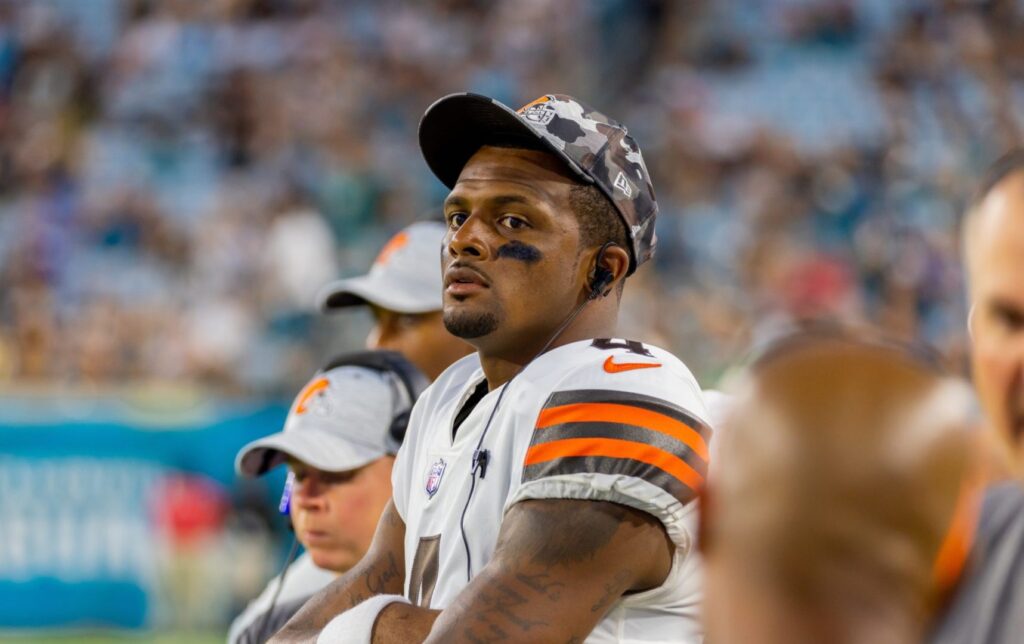The Cleveland Browns face a daunting challenge this season, stumbling to a 1-4 record after a crushing loss to the Washington Commanders. The defeat underscored the ongoing struggles of quarterback Deshaun Watson, whose performance has been under intense scrutiny.
Watson’s recent game was a study in disappointment. He passed for a meager 125 yards, his lowest output in two seasons barring injury-shortened games. His lone touchdown came in the fourth quarter, with the Browns already trailing by 28 points in what ended as a 34-13 rout.
As Week 5 concluded, Watson found himself languishing among the NFL’s least effective quarterbacks. He entered the game with a dismal 23.6 quarterback rating, the lowest among qualifying players. His average of 181.8 passing yards per game ranks sixth worst among quarterbacks with at least four games played this season. Through five games, he’s thrown just five touchdowns against three interceptions.
The decline has been stark since Watson joined the Browns at the end of the 2022 season. His QBR has consistently placed him in the bottom third of the league, though he didn’t qualify for rankings in the last two seasons due to limited playing time.
This trend is particularly alarming given the Browns’ substantial financial commitment to Watson. He ranks second among all quarterbacks in guaranteed money, with a contract that poses severe penalties if the team decides to cut him. A pre-June 1 release would leave the Browns owing $92 million while incurring a staggering $173 million salary cap hit. Even waiting until after that date would result in over $86 million in penalties over the next two seasons.
Adding salt to the wound, former Browns quarterbacks are finding success elsewhere. Baker Mayfield, the first overall pick in the 2018 draft, has led the Tampa Bay Buccaneers to a 3-2 record this season, throwing 13 touchdowns against just two interceptions. Joe Flacco, Watson’s backup last season, has excelled with the Indianapolis Colts, tossing five touchdowns without any interceptions in just two games.
Watson’s on-field struggles are further complicated by off-field controversies. In 2021, 22 women filed lawsuits against him alleging sexual misconduct and assault. Despite these serious allegations, the Browns traded three first-round picks and signed Watson to the largest contract in NFL history, with the most guaranteed money at the time.
The shadow of controversy deepened in September 2023 when a new lawsuit alleging sexual assault and battery was filed against Watson, adding to the ongoing turmoil surrounding him.
Despite mounting pressure and criticism, Browns head coach Kevin Stefanski has publicly backed Watson, stating, “We’re not changing quarterbacks.” This unwavering support may reflect the team’s commitment, but it also raises questions about their strategy moving forward.
The situation in Cleveland is further complicated by the success of other quarterbacks who once donned the Browns’ colors. Their achievements elsewhere serve as a stark reminder of what might have been and intensify the scrutiny on Watson’s performance.
As the Browns navigate this tumultuous season, they find themselves at a critical juncture. The team must grapple not only with Watson’s on-field struggles but also with the financial implications of his contract and the ongoing controversies surrounding him.
The coming weeks will be crucial for Watson and the Browns. Fans and analysts will be watching closely to see if the embattled quarterback can turn his performance around and justify the team’s significant investment in him. The pressure is mounting, and the stakes couldn’t be higher for a franchise desperate for success.
For now, the Browns seem committed to their course with Watson at the helm. But as the losses mount and the criticisms grow louder, the question remains: How long can they afford to wait for a turnaround? The answer may well define the future of the franchise for years to come.




